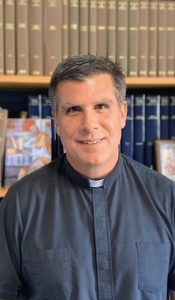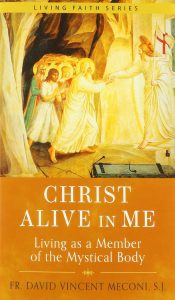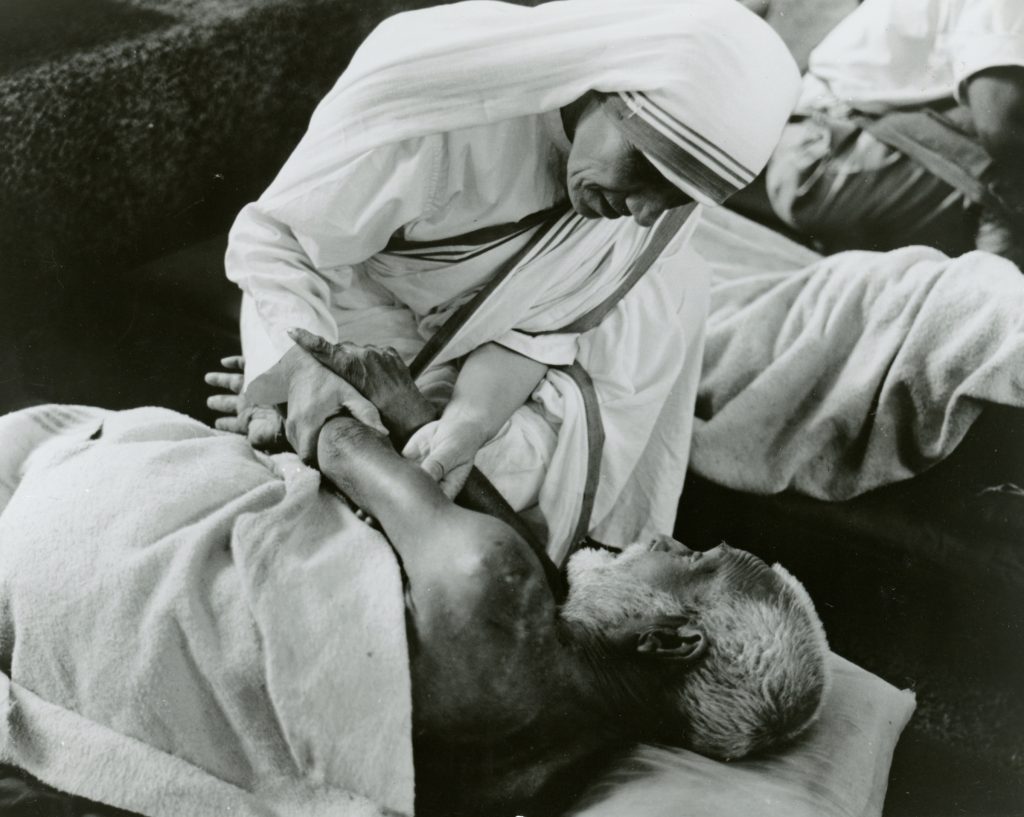In “Christ Alive in Me: Living as a Member of the Mystical Body” (Emmaus Road, $22.95), Father David Vincent Meconi, SJ, recalls an encounter with a street preacher.
She asked him, “Do you have a personal relationship with Jesus Christ?” His answer: “I do, but I don’t want one.” She was shocked. He was shocked. This answer sprung from his mouth without prior planning.
“With you and with friends,” Meconi continued, “I want a relationship. But with Jesus Christ, I want something else. I do not want a relationship; I want something more. I want union. I want his words to become my words, the way he looks at people to become the way I look at people, for my heart to become his heart. I want his incarnation to continue in me.”
“Christ Alive in Me: Living as a Member of the Mystical Body” provides an engaging exposition of this central message of the Gospel. Jesus is not just a teacher, however wise, nor a mere guru who gives us a great example. He is the vine, and we are the branches. He is the head, and we are his body. He can live in us, and we can live in him. This reality is called by different names such as divinization, “theosis,” and deification. The truth at issue is that we become not just pupils of a divine teacher, but children of God adopted into the Divine Family of Father, Son, and Holy Spirit.

As Father Meconi puts it, “Since the Son of God has taken my human nature to himself, my humanity is empowered to do things ‘in Christ’ that no mere human could — for example, I can love my enemies, I never need to give in to my own fallen passions and desires, I can live with joy and purpose, and everlasting bliss, and so on.”
Father Meconi explores this idea of “Divine Adoption” in a way that resonates with me personally as someone who was adopted. Adoption (by human parents or by God) is not an achievement of the one who is adopted.
I did not become a member of the Kaczor family by winning some competition among the other newborns at St. Anne’s Baby and Maternity Home in Spokane. Rather, the initiative belonged to my parents in choosing me. I did not earn a place in the Kaczor family through my outstanding behavior in the crib. So too, to become a child of God through baptism is not the result of our own efforts, merits, and excellence, but it is a pure gift from God.
In becoming part of the Kaczor family, I received a new identity as a Kaczor, an identity that shapes me to this very day. So, too, in becoming a child of God an individual is forever marked as belonging to God, as part of the Divine Family.
Father Meconi emphasizes the consequences that follow from this Divine identity that we share in Christ. Following St. Augustine’s teaching, Father Meconi emphasizes three ways of encountering Jesus: “Christ himself teaches us that his very body born of a Virgin is also encountered in the Eucharist he instituted for all time on Holy Thursday, which, in turn, is to be fed and clothed and visited in his Mystical Body, ‘Whatever you did for one of these least brothers or sisters of mine, you did for me.’ ”
Perhaps of all the most recent saints, St. Teresa of Calcutta best exemplified these three encounters.
“In Mother Teresa we find a woman who adopted our God in heaven with an intensity that often left her desiccated and confused about how close God really was in her, a woman who spent hours before the Blessed Sacrament and received our Eucharistic Lord daily for decades, and a woman who spent her life serving the poorest of the poor.”
Her efforts were not mere social work, but animated with a purity of intention that arises from a deep understanding that she was a child of God. Of course, most of us are not going to move to Calcutta to care for orphans and lepers in the slums. But St. Teresa was the first to say that we all have a mission to love — which is, of course, the very mission of Jesus — wherever we find those in spiritual or bodily need.

This call to live more fully the reality of Divine Adoption is not just a call for priests or sisters, but for everyone. This identity does not destroy our individuality but enlivens it.
“Alone, a piece of iron is hard and resistant,” writes Father Meconi. “But if that piece of iron is put into a fire, it takes on a new nature. It does not cease being iron, but now it shares in the luminosity and the heat of that flame. In that fire, the iron now takes on new dimensions: it becomes aglow, it becomes malleable and able to be worked into whatever the craftsperson needs. This is our soul in Christ. Alone and part from our Creator, we remain hard and recalcitrant. But as we allow ourselves to let divinity enrapt us, we do not cease to be human, but we take on a new nature not our own: we become illumined and manageable in the Father’s hands. We take on a new life that elevates and thus perfects our humanity as we now come to realize what the meaning of life and our existence has been all along.”
In “Christ Alive in Me: Living as a Member of the Mystical Body,” Father Meconi provides a winning and witty presentation of the point of human life and the deepest desires of the human heart. In our baptism, we are made children of God. In our everyday life, we are called to live that reality.

